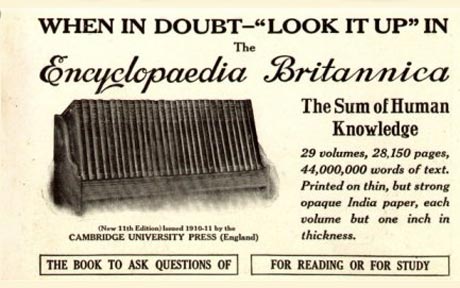 The news has been pretty steady since the Britannica announcement (via NY Times):
The news has been pretty steady since the Britannica announcement (via NY Times):
…After 244 years, the Encyclopaedia Britannica is going out of print.
Those coolly authoritative, gold-lettered reference books that were once sold door-to-door by a fleet of traveling salesmen and displayed as proud fixtures in American homes will be discontinued, company executives said.
In an acknowledgment of the realities of the digital age — and of competition from the Web site Wikipedia — Encyclopaedia Britannica will focus primarily on its online encyclopedias and educational curriculum for schools. The last print version is the 32-volume 2010 edition, which weighs 129 pounds and includes new entries on global warming and the Human Genome Project…
But, you’ve been reading here for sometime. This transition is something you’ve known about and have already adjusted your perspectives, behaviors, and tools towards.
Oh. You’re surprised?
Well, maybe we should talk some about how to help you or your publishing team/group transition to more/full digital approaches?
Going Digital But Not Losing Impression
Maybe its something easier for us to say since MMM started as a mostly-digital artifact. But, we get it. Some people don’t forsee changing, and are throughly offended if the emotional connection and appeal to this idea that bits and bytes can replace the acquisition and internalization of material via text. It takes massive cultural movements to consider and change to a different approach – and in some cases, you have to be throughly compelled.
That’s where you start thinking about it now though. What are the core characteristics of your content, of your relationship to your consumer audiences and your advertiser audiences? What does going digital (whether that’s mobile, social, or distribution methods) enable or hinder? Do you sense a loss of control to that core message, or the attachment to those audiences if you go digital? Are those fears grounded in reality (statistics, case reports, etc.) or on perceptions gleaned from your contexts (media, conversations, etc.)?
When we stopped creating a downloadable magazine, it was in part because of the time, energy, and resources that were essentially wasted for too small a return. Going digital distribution only we had to make some decisions on control (what if people could subscribe via email, RSS, SMS) and frequency (multiple times a day to once a day) alongside other considerations. In the end, this move works for us based on the needs of our audience. We’ve got more to do, and digital affords that in part without totally upending agreements, contracts… those logistical concerns. At the same time, we had to be firmer in what we wanted to do with this channel.
Britannica is making those same decisions. Logos (who’s cited in our previously linked 2011 report) has made and continues to make thesse changes. You’ve got to move forward, while keeping a clear sense of what made you valuable. Its not the smell of the paper, its what was on those pages that you offered that no one else could. Capture that in your digital transformation and watch digital be the ripe and fertile ground you’ve been looking for.